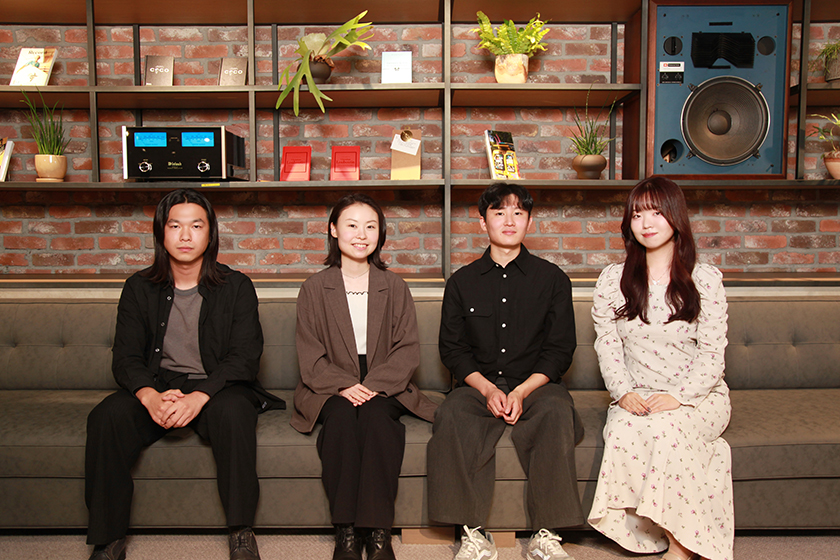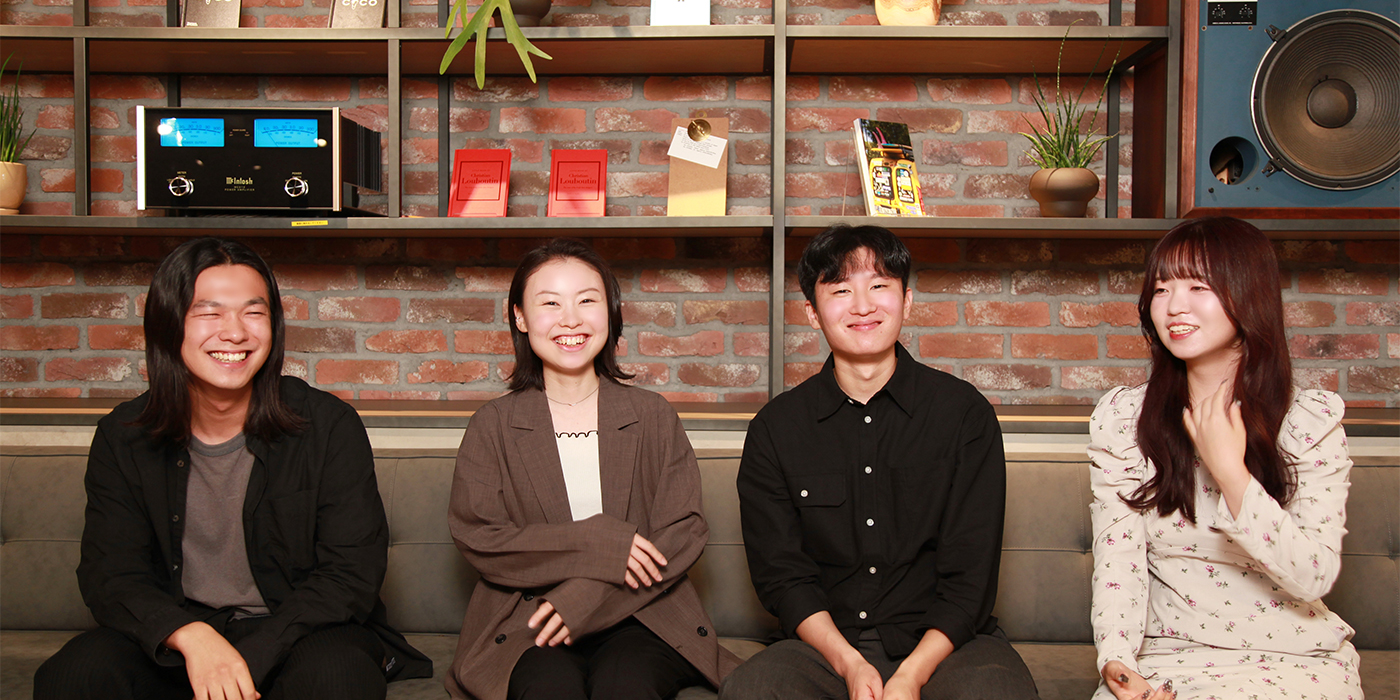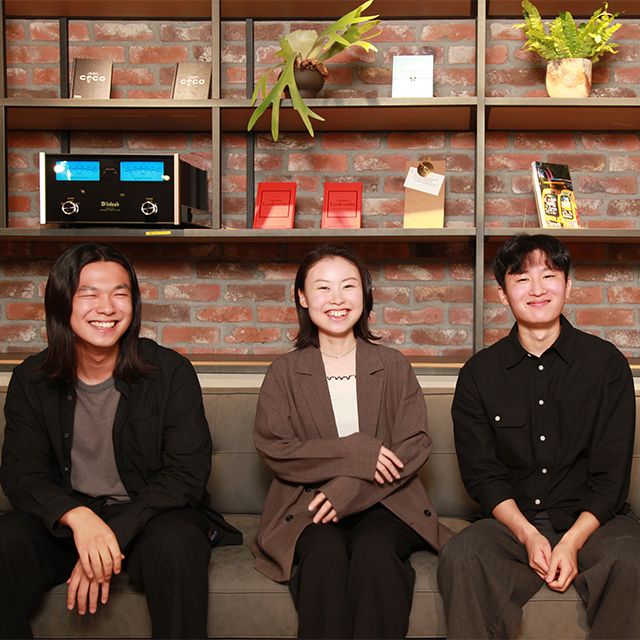In 2025, Avex once again welcomed a new class of graduates, each carrying big hopes for the future. This time, we brought together four of them to openly talk about what they have discovered since joining the company, the realities of the entertainment industry they are beginning to see, and the ways they are starting to define how their generation will take on challenges and make its mark.

(Photo from left)Manato Yoshioka / Kano Kikuta / Gyeongmin Park / Honoka Kai
Navigating “Freedom”
The four participants who gathered this time joined the company in April 2025. By the time of this roundtable, six months had passed since they began their new journeys. As fresh graduates diving headfirst into the entertainment industry, they have likely experienced moments when their values and assumptions were deeply shaken. To begin, we asked them how their environment and mindset have changed since joining the company.
Manato Yoshioka, who works in sales for music distribution services at Avex Music Creative Inc. (AMC), shared his thoughts first.
Yoshioka "When I thought of an entertainment company, especially Avex, I imagined a work environment that was dazzling and glamorous. But after actually working here, I’ve come to realize that what really matters are the steady efforts and the accumulation of countless small processes behind the scenes. I feel this every single day."

Kano Kikuta, who works on promotional campaigns for anime titles as an Assistant Producer at Avex Pictures Inc. (API), agreed with Yoshioka’s experience.
Kikuta "I totally agree. I used to think the entertainment industry was all about freedom, but in reality, there’s a kind of steadiness that supports that freedom. Right now, I’m learning that foundation in order to be truly free. By watching how my senior colleagues work, I’m starting to understand what defines API, its core identity, and how to build from that base to deliver entertainment that’s both creatively free and enjoyable. I’m truly feeling both the challenge and the joy of that process."
Meanwhile, Gyeongmin Park, who handles social media promotions for artists at AMC, has a somewhat different perspective on “freedom,” shaped by his personal background of spending his youth in both Korea and Japan.
Park: "During my job interview, I was asked, “Park, this job can have a pretty gritty side at times, are you okay with that?” I smiled and responded, “No problem at all! I got real grit in my teeth during my military service!” Now that I’m actually working, I’ve realized that, of course, business etiquette and communication are crucial, being polite and respectful to people both inside and outside the company, but at its very core, I feel it’s not so different from when I was a student freely doing creative projects. I still wake up, go to the office, eat lunch with colleagues as I once did at school, and ponder, “What can I do next to make the project even better?” That feeling hasn’t changed. Of course, there are professional boundaries, but within those, I have the freedom to share ideas openly. Even though many on my team are older, they genuinely value the opinions of younger members, and that’s where I really feel Avex’s sense of freedom."
On the other hand, Honoka Kai, who plans and manages social media content at Avex Management Inc. (AMG), laughed and said, “For me, the environment feels completely different from university life.”

Kai "Compared to my university days, I’ve become incredibly busy (laughs). My role is a little unique, even within Avex. I work in artist management, where talent is at the core of what we do. Because of that, I had imagined the work environment would be a bit more businesslike and composed. But in reality, I can really feel how passionately everyone cares about the artists. I mainly work with elementary and middle school–aged artists, and since they’re at such a sensitive stage, they can often see right through how we’re feeling. That has taught me just how important it is to approach them with genuine love and sincerity."
Translating the Values of the
Younger Generation into Society
As these young employees navigate the rough waters of working life, what gives them strength are the comrades walking alongside them. Do the new graduates who joined Avex this year stay in touch with one another in their day-to-day lives?
Kikuta "I’d say we’re really close. We’re always chatting in our group, and we regularly organize dinners just for those of us who joined this year."

Yoshioka "This year, there are 19 new graduates, but we’re placed in different sectors, and the work we do varies quite a bit. So rather than feeling any rivalry toward one another, we really see each other as supportive colleagues."
Kai "Everyone’s busy in their own way, and the first year is tough for all of us, so it’s natural that we can’t meet up casually all the time. But just knowing that I have colleagues who are also working hard has been a huge source of support for me."
Park "We often ask each other questions and share knowledge because everyone has their own strengths. For example, I’m familiar with Korean culture and social media trends."
Yoshioka "When you’re focused on your own tasks, it’s easy to get caught up in your own perspective. That’s why having colleagues who can offer a different point of view is invaluable. I’m responsible for bringing creative work produced internally out into the world, and by talking with my peers, I’ve been able to understand the flow of creativity from the very beginning to the final output."
Having peers who show you perspectives beyond your own, these lateral connections are sure to remain a valuable asset on their journeys ahead. So, from their perspective, what are the strengths of the younger generation? And how might those strengths impact Avex as a whole?
Kai "I think one of our strengths is that we can sense trends without actively looking them up. We just know what’s “cool” or “in” instinctively, and that awareness exists in real time as a shared understanding within our generation. But trends are fleeting, and relying on that alone means an artist’s popularity can fade just as quickly. To ensure artists are loved over the long term, Avex’s accumulated expertise is indispensable. I feel that by combining that expertise with our current instincts, we can create new artists in a truly meaningful way."
Park "I agree. That sense of style and trend awareness is important, but I also think curiosity is another big strength of our generation."

Kikuta "I think our generation doesn’t shy away from engaging with different kinds of content. We’re curious and willing to dive in, and we have the ability to absorb new things. In my current environment, for example, senior colleagues are always on the lookout, spotting interesting or novel ideas and discussing how they might apply them to our work. Because we have a workplace where each person’s discoveries can actually be put to use, it makes a huge difference that we, as young people, can approach new things with curiosity and take on challenges. I’m sure everything we explore ends up having a meaningful impact."
Yoshioka "We’re often called the “digital native generation,” and I think one of our strengths is precisely our ability to handle the sheer amount of digital information and filter it effectively, our keen sense of trends, so to speak. At the same time, we’ve grown up very aware of differences in digital literacy, especially among people who aren’t as comfortable with technology, like my parents, for example, who still struggle with mobile phones and apps. Having navigated those differences throughout our lives, we’ve developed a kind of translation skill. Now, in our roles delivering entertainment to the public, that ability to bridge gaps between different perspectives has become one of our generation’s key assets."
Facing What We “Love” in the World
When we asked the four of them why they chose to work in the entertainment industry, they all agreed on one point: they wanted to turn “what they love” into their work. Yet now that they are actually on the job, each of them is navigating their own questions and challenges about how to incorporate their personal “love” into their daily tasks, and how to manage the doubts and struggles that come with pursuing what they truly “love.”

Park "I’ve always been very confident in what I “love,” but since joining the company, I’ve come to realize anew that “what I love isn’t necessarily what others love.” That said, I don’t think that means I should doubt my own “passions.” When creating a new project, I want to stay true to what I “love.” Instead of giving up because others might feel differently, I want to appreciate that divergence and try to dig deeper: Why do I love this, and why don’t others? By holding on to my own feelings while acknowledging that gap, I’ve learned from the people around me that new insights emerge. There are plenty of ideas that I find interesting but that don’t get approved, but by calmly and persistently staying true to my own “loves,” I believe I can eventually create something that reaches the world."
To surprise or excite audiences with something no one has ever seen before, the works and content they create may need to be slightly outside the “normal” perception of many people, yet backed by a strong, unwavering intention. At the same time, Kikuta emphasizes that it is also important to remain flexible and adapt to the audience while holding onto the core of what you believe in.
Kikuta "As Park mentioned, staying true to your own “passions” is incredibly important, but I also feel it’s equally important to engage seriously with what others “love.” For example, every time we release information or unveil content, there are often reactions that differ from what we expected. I’m learning firsthand how to take those gaps as lessons, brainstorm ways to adjust, and refine our approach and thinking, “Maybe if we present it this way, it could buzz.” That process of iteration and learning is something I’m experiencing every day."
Because each person’s “love” is deeply personal, it is not simple nor easy to predict.

Yoshioka, however, senses a "human element" in these differences.
Yoshioka "I’ve had similar experiences. For example, when distributing a song, I might think it’s a great piece myself, the distributors’ responses are also positive, and I expect users at the other end to react just as well, but sometimes that’s not the case. And the opposite happens too. I think that’s because everyone, the distribution team, and ultimately the users, are all human. Accurately gauging what people “love” isn’t easy. There’s often a gap between our expectations and how a release actually develops, and I want to get better at understanding that gap more deeply."
In the entertainment industry, turning what you “love” into your work also means sincerely engaging with what the audience “loves.” The drive to overcome those challenges often comes from the love they feel for the work itself. The four graduates are likely feeling firsthand just how essential passion is in this field.
Amid this, Kai reflects on how passion manifests in her daily work, based on her experiences since joining the company.
Kai "In management, I feel it’s especially important to think about the artists constantly. Our department’s group chat is always active, but we don’t just discuss work tasks; it’s also a place to share little insights from everyday life, like sharing something someone saw on TV and thinking, “This might suit that artist.” Even our meetings often include casual conversation, and at first, I thought this type of conversation wasn’t efficient, but actually, it’s the opposite. By sharing these small observations every day, we often find hints that connect the dots and lead to new ideas. Thinking about the artists every day naturally makes you more aware of what people in the world “love,” and I’ve realized that this directly improves my work performance."
Taking on the Next Entertainment
Challenge at Avex
Finally, we asked the four about what they hope to challenge in the future.
Kai "My biggest dream is to make Avex the kind of company where, when people think of Avex, almost all of the artists they associate with it are trendsetters of the Reiwa era. To make that happen, I imagine myself eventually taking on roles like producer or manager, and I want to become someone who can thoughtfully and lovingly bring out the strengths and individuality of the people around me. I truly believe great artists come from great organizations, so I hope to play a part in building that kind of environment."

Park "It’s a big dream, but I want to launch an artist from Avex who can cause a global social phenomenon. I want to work with an artist so overwhelming that everyone in the world has heard of them."
Kikuta "For me, nothing would make me happier than people thinking, “When it comes to anime, it’s Avex.” Not just in Japan, but also overseas, where people recognize Avex as the company behind that work and those great works. I want to contribute to making Avex a company where audiences, both domestic and international, know that if an anime is exciting, it’s because Avex is behind it."
Yoshioka "Entertainment constantly evolves, with new things emerging all the time. I hope Avex continues to be a company that warmly embraces any creator and any kind of audience, regardless of their tastes or sensibilities. Within that environment, I want to expand my awareness and keep catching new things. I want to be someone who’s tapped into every form of expression, music or visual, so that I would become a person who people think, “Yoshioka would know everything.” I want to keep refining that breadth, that agility."
Through every word from these four, it is clear how meaningful and intense their first six months at Avex have been. They are fully aware of the characteristics and strengths of their generation and are actively exploring how to leverage them, figuring out the best ways to take on their own challenges every day. It is exciting to imagine what these four will achieve in the years to come.

(Photo from left)
Avex Music Creative Inc.
Manato Yoshioka
Avex Pictures Inc.
Kano Kikuta
Avex Music Creative Inc.
Gyeongmin Park
Avex Management Inc.
Honoka Kai









